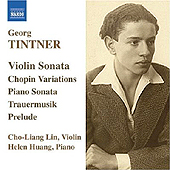
ESSENTIAL RECORDINGS

When Georg Tintner passed away tragically in 1999, not only did we lose a very good conductor, we also lost a great
composer. Many times throughout his life, he moved from one conducting post to another until he settled in Canada
in 1987, as Music Director of Symphony Nova Scotia in Halifax. He made many good recordings during his career, but
the ones that won him many praises and respect are his recordings of all the Bruckner Symphonies for Naxos produced
at the very end of his life.
He considered himself a "composer who conducts, with an ambition to write beautiful music". I believe he was right
on both counts. His music is definitely beautiful, and I assume that had he been allowed the option to continue
composing throughout his life, that his compositions would have greatly surpassed his need to conduct for a living.
Most of his writing was done in the early stages of his life, and his Austrian roots poke through the foundation of
all his music. It is music with purpose, intent, vision, and strongly Late Romantic in it's layout, with long intervals,
big harmonic leaps, forward looking but strongly attached to the past in it's emotional outlook.
The Violin Sonata for example, written in 1944, shows a composer who knows how to introduce different motifs or
subjects and develop them to their full potential all the while keeping a clear focus on the work as a whole. The
Scherzo movement for example has the subject matter moving from violin to piano and back, from right hand to left
hand and back, from dark tinges to bright and bold moments, constantly maintaining a strong momentum and sense of
direction at all times. It is hyper-romantic and avant-garde all in one, with the great Cho-Liang Lin pushing the
expressive limits of his violin and Helen Huang providing an equally strong line from the piano.
The piano Prelude - Sehnsucht (Longing) is straight out of Scriabin territory. The piano work Auf den Tod eines
Freundes (On the Death of a Friend), written when he was a teenager, sounds like something an older Robert Schumann,
or even an old Brahms would have written. And the one movement Piano Sonata, written around the same time, is again
Scriabinesque in it's long intervals, bold harmonies, one could even say a certain level of "idées de grandeurs",
and constant crosstalk between both hands as they share thematic material in one strong solid line from start to
finish. Amazing stuff that you would assume was written by someone much older.
Thank you so much to Lin and Huang for taking the time to learn and master these obscure pieces and sharing them
with us, and again, Bravo to the people at Naxos for giving us the opportunity to hear great music that might
otherwise have been lost forever.
After 1962 he fell virtually silent, owing to a combination of personal tragedies, the loss of his culture
and transplantation into alien lands where he was little understood, and not knowing which language to use once
serialism had had it's day. His inability to express himself was a matter of enduring grief to him. Although his
music was not suppressed, as was that of many Jewish composers, he was certainly a "lost composer". {Tanya Tintner}
Jean-Yves Duperron